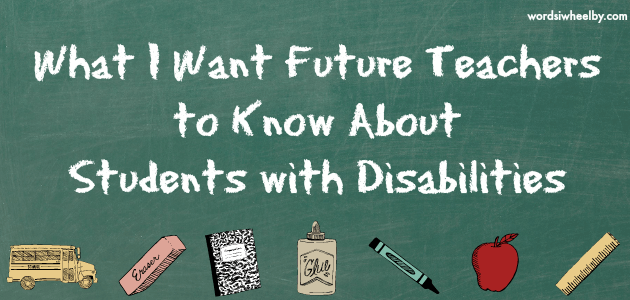The following post was written by Emily Ladau and originally ran on Words I Wheel By.
 One of my favorite things about writing on disability is that it ignites conversations and sparks perspective shifts (both mine and others) in seemingly endless ways. Recently, I got an email from someone I connected with last year at a conference, and the questions she asked got my wheels turning. I knew I wanted to respond in a blog post. I hope that sharing my answers will in turn open a dialogue for other people to share their thoughts on the subject.
One of my favorite things about writing on disability is that it ignites conversations and sparks perspective shifts (both mine and others) in seemingly endless ways. Recently, I got an email from someone I connected with last year at a conference, and the questions she asked got my wheels turning. I knew I wanted to respond in a blog post. I hope that sharing my answers will in turn open a dialogue for other people to share their thoughts on the subject.
The email read: “Since we met last year at the AUCD conference, I have completed my PhD and landed my first assistant professor job. I am writing because I would like your input on how to address vocabulary with my students. I am a certified ‘special’ education teacher. Textbooks for my courses have either ‘special’ or ‘exceptional’ in the titles. The laws and legislation include the same vocabulary. From your perspective, how can I address the ‘special’ vocabulary? What are the three (or more) main concepts/ideas/philosophies you want pre-service teachers to know? What advice do you have for me as I prepare future educators? Thank you, Emily. I look forward to hearing from you.”
Tackling Terminology
“Special, “exceptional,” and other sugar-coated words like this are rampant in professional, legal, and academic spheres. It’s euphemistic, a way to avoid mention of disability, because disability is far too often perceived as a dirty word.
From my perspective, every child has unique needs in the classroom. And yet, students with disabilities are still differentiated and given labels for requiring certain adaptations or accommodations. The “special” students have extended time to take tests. The “exceptional” students must take adapted physical education. But doesn’t each student have different learning styles and different ways of getting things done? True, not all students have an Individualized Education Plan (IEP) to set forth specific accommodations, but just because the means may be different from a typical student, the end is the same. The test is done. The class is completed.
Moreover, in spite of attempts to avoid calling attention to disability, “special education” has taken on negative social connotations of its own. Unfortunately, though, there is no universally accepted alternative term. I’d suggest “adaptive education” as another option, because it has the most accurate definition: education that is modified to be suitable.
But since “special education” is the term we’ve got to work with, I feel it’s less critical to focus on a language shift, and more important to encourage a mentality shift. Educators should always remember that students who require various forms of special education are equal to all other students. A phrase does not define a whole person.
What Should Future Teachers Know?
This, then, leads to the first idea I’d want educators-in-training to consider. Students in special education programs are going to grow up. I know this sounds obvious to the point of almost being silly, but “special” can be the kind of thing that follows people throughout their lives. Students who have diverse academic needs still deserve to receive an education that both brings them to and meets their fullest potential.
Second, the best kind of education is inclusive education. I’m not entirely denouncing programs that are targeted for students with disabilities, but all students deserve the same opportunities. Segregating students with disabilities from their peers sends the message that differences are bad, and that separation is the norm, and this is an incredibly harmful line of thinking to promote.
Click here to read the rest of Emily’s article.
